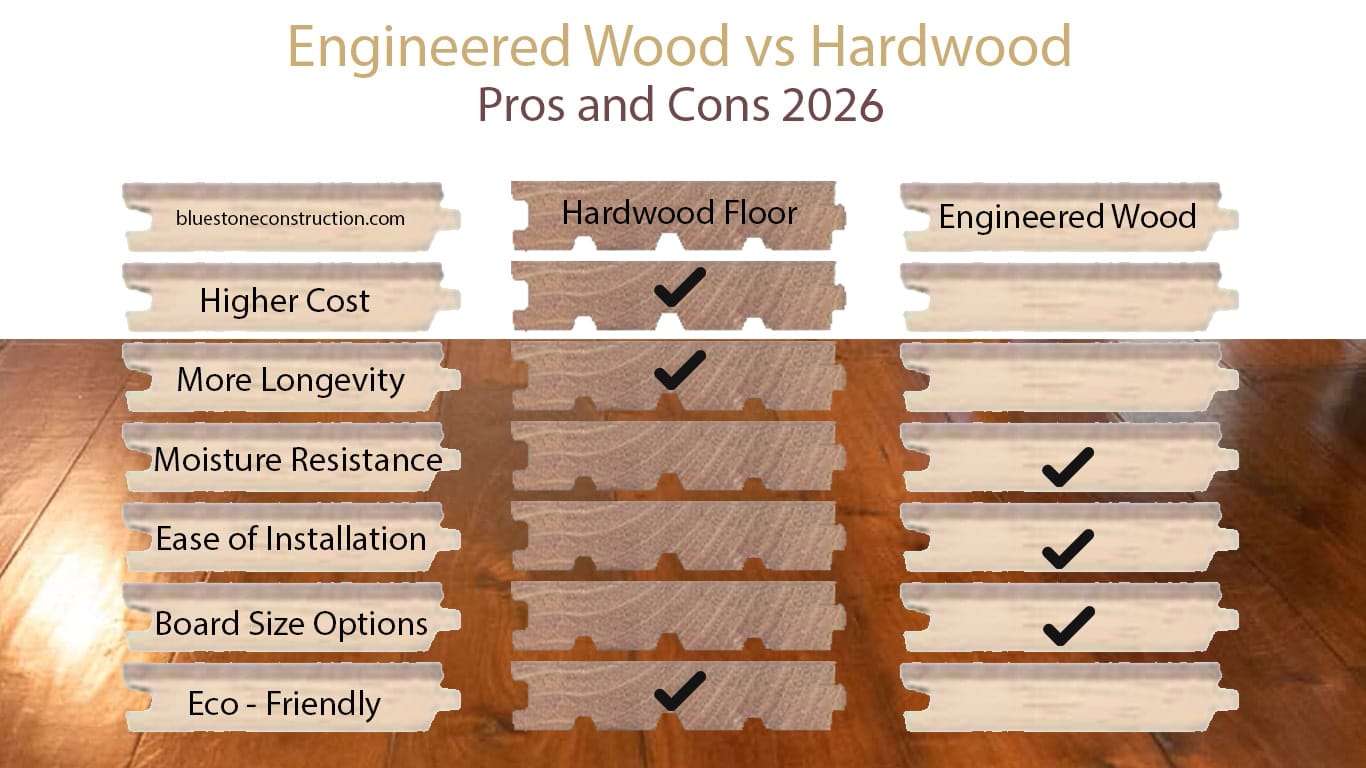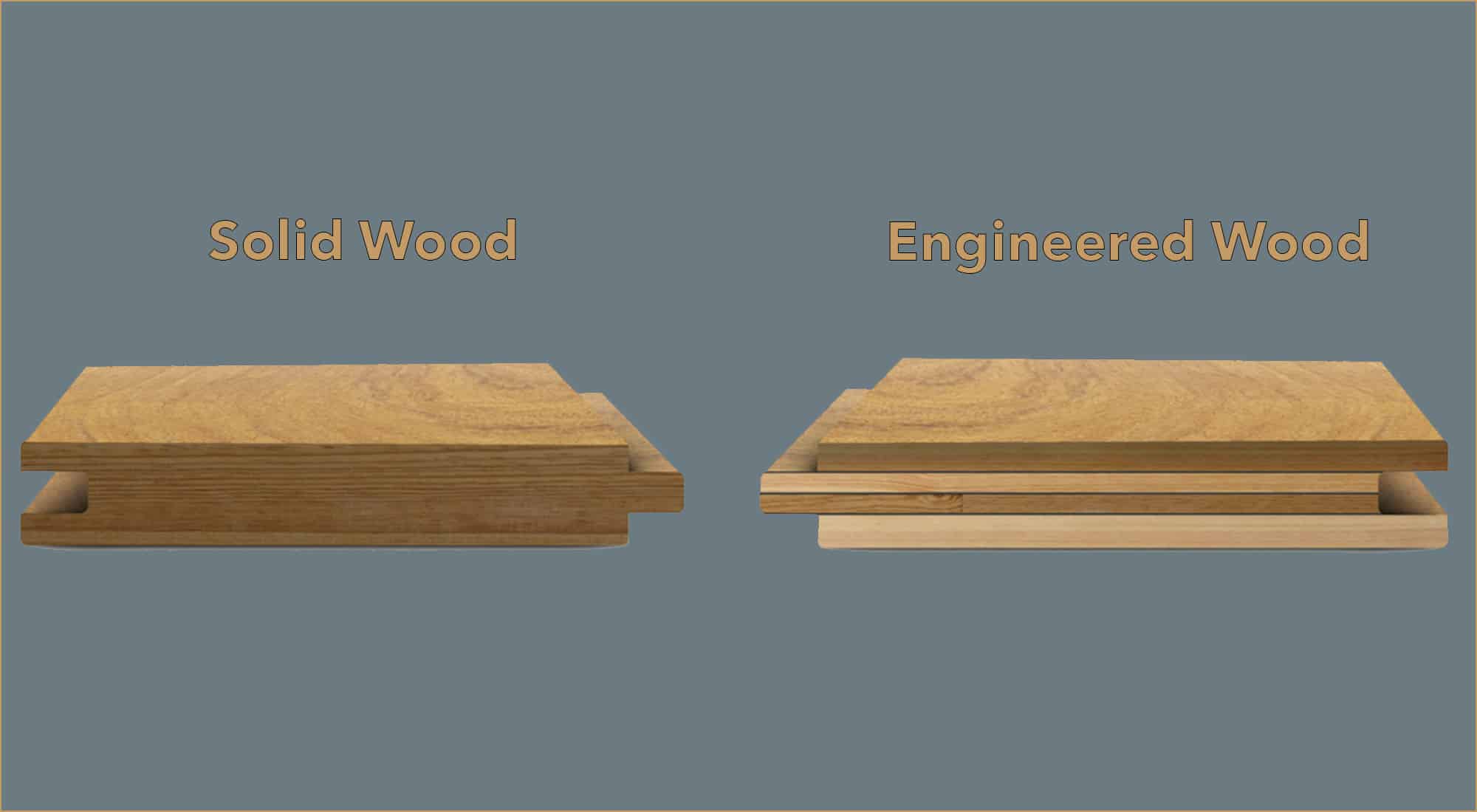Homeowners prefer hardwood floors when they want classic, durable, beautiful, eco-friendly, and long-lasting solid wood flooring that is increases the home’s resale value. There are many benefits of engineered wood floors as well: they can be less expensive, more resistant to moisture, and easier to install, and they have the option of being manufactured in much wider widths. Our team of luxury custom home builders in the Carolinas can tell you flooring is a big deal. You don’t want it to detract from the value of the home. As you research the pros and cons of engineered wood flooring versus hardwood flooring in 2026, we’re here to help.
Which Is Better, Engineered Wood Flooring vs Hardwood Floors?

A common conundrum we help clients navigate is engineered wood flooring versus hardwood flooring. Both come in unfinished (i.e., finish on-site) and prefinished varieties. Hardwood floors are any flooring that has a real wood surface as its top layer. Woods used include oak, walnut, hickory, maple, cherry, and ash. Engineered wood flooring has a plywood sublayer with a “real” thin veneer hardwood wear layer on top. Though it’s hard to tell the difference between hardwood and engineered wood flooring, we will take you through the different pros and cons: which one looks better, wears better, is easier to clean, is more cost-effective, is more affected by weather and humidity, and has environmental considerations.

Here’s our perspective.
The Benefits to Solid Hardwood Floors
1. They’re classic. Hardwood flooring takes on a seamless, uniform look that is hard to beat. When done properly, it can be a beautiful, long-lasting floor.
Traditionally, all hardwood flooring was solid wood strip flooring in narrow widths (typically 2 ¼ inches), installed by a flooring mechanic and finished on-site. Many companies continue to install hardwood flooring in this traditional manner. For some time, oil-based polyurethane products were used for finishing, whereas today, water-based polyurethanes tend to be the most popular, along with combination, one-coat/finish products. Buyers tend to react positively to homes that feature hardwood floors as well.
2. They’re durable. It’s not uncommon to find hundred-year-old homes with the original hardwood floors still intact. When the time comes, hardwood floors can accommodate sanding and refinishing — and can do so more times on average than engineered wood floors.
The key to long-lasting solid hardwood floors? Proper installation. The most important factor in a successful floor installation is acclimating the wood to the house and the subfloor, according to specific guidelines prescribed by the National Wood Flooring Association. Luxury home builders manage many hardwood floor installations and ensure the appropriate steps are taken each time.
3. They offer options. Hardwood flooring is available in colors ranging from dark espresso to whitewashed. Go with traditional, smooth, and seamless, or get modern textures like hand-scraped, wire-brushed, and distressed. Finishes are offered in satin, matte, shiny, and oil. Add a degree of customization and sophistication by installing unique patterns, mixed-width boards, laying floors diagonally, etc. For those who are concerned about sustainability, there’s always reclaimed wood, bamboo, or specific suppliers that specialize in sustainable wood flooring.
The Downside to Solid Hardwood Floors
1. Hardwood floors can be more expensive. Of course, this depends on factors such as where you purchase materials, who performs the installation, which materials you use, what types of personalization or texture you might want to add, and more. Generally, though, expect higher installation costs for luxury home features like hardwood floors versus engineered hardwood floors because they are more labor-intensive.
2. They show wear. Each type of wood has a different hardness. An Austrian wood researcher named Gabriel Janka designed a system of classifying the hardness of wood that is known as the Janka hardness test. These figures are good baselines to understand how hardwood floors might perform over time. Protecting your floors is easily accomplished through simple care practices, like placing carpets in high-traffic areas and using adhesive felt pads on the bottoms of chair and furniture legs.
Hardwood floors signify ultimate luxury, but is it really your best option?
The Benefits of Engineered Wood Flooring
1. Engineered wood floors also offer exceptional options. Engineered wood floors are available in the same colors, textures, and finishes as hardwood floors. In some cases, the manufacturer’s finishes on engineered wood floors will last many years longer than any finish that could be applied on-site. The biggest advantage of engineered wood floors is that they can be manufactured in much wider widths than solid wood products. With hardwood flooring, home builders won’t install a solid plank any wider than 5” because of the extremely high risk of cupping or shifting over time. But engineered wood floors can be installed in 10–12” widths with no concerns. Design-wise, this means more options; build-wise, it means faster installation.
2. Engineered wood floors are less prone to damage from moisture fluctuations, and they can be installed on concrete. Flooring for basements or other lower-level areas is no longer restricted to concrete sealing, laminate, tile, or carpet. Engineered wood flooring can be installed on a concrete slab, “which is unthinkable with solid wood,” says Reed. This is because engineered wood floors are more resistant to changes in moisture than hardwood floors and therefore less likely to shrink or expand across the seasons.
3. Engineered wood flooring is fast to install. From manufacturing to on-site, engineered wood floors save a lot of time. They are available in unfinished (which means we finish them on-site) and prefinished varieties. It’s best to work with your contractor to select the highest-quality options available.
The Downside to Engineered Wood Floors
1. Good quality isn’t cheap. Engineered floors are made of 3–12 ply layers of soft or hard woods that are cross-layered, glued, and pressed together, all topped with a hardwood wear layer. “The higher the quality, the thicker the wear layer,” says Reed.
What makes a thicker wear layer? The way the wood is cut. When it’s sliced/sawn, it can produce a thicker wear layer, show a finer grain, and look more like hardwood floors. When it’s rotary cut, the wear layer will be thinner, but it also offers wider graining and a unique look. And the details matter. I’m a big fan of engineered wood floors, but they have to be the more expensive ones, or else they look junky and collect dirt.
And just like hardwood floors, engineered wood floors will wear with age and time. Resanding and refinishing can be done, but not as many times as hardwood floors, because eventually, you’d sand away the entire wear layer.
2. They can off-gas. Those sensitive to chemicals or seeking the most environmentally friendly flooring should do their homework when selecting engineered wood floors. Consumer Reports performed testing that showed a higher incidence of formaldehyde within samples of engineered wood and laminate plank. If you work with a luxury home builder to design, build, or preserve your custom home, they will discuss the most eco-friendly options.
The Final Word on Wood Floors?
Remember — there is no other surface area in your home that you will have such frequent, intimate contact with than flooring. It greets the soles of your feet when you roll out of bed in the morning. It’s there when the new puppy prances in from the yard, covered with mud up to its belly. It catches the crumbs and drippings of your culinary experiments. It supports your children or grandchildren learning to walk.
And of course, flooring has tremendous aesthetic value. A shiny hardwood floor or marble tile foyer makes a much more dramatic impression in mountain-style homes and other luxury homes than carpeting. Flooring has qualities— temperature, strength, shine, color, size, quality, and pattern. Your home’s architecture, interior design, and style have to harmonize with your flooring, particularly when the flooring spans the home or multiple rooms. This isn’t necessarily the case for furnishings and paint colors, which have less responsibility and can be changed out more easily.
If you’ve ever watched a home-building reality television show, you’ve seen misguided and panicked individuals building multimillion-dollar homes, realizing all too late that their budget is off, and they need to skimp on things like flooring and lighting fixtures. It’s a bit soul-crushing. It’s also an unfortunate decision from a reselling point of view.
There’s a lot to know when it comes to flooring. Working with a builder like Bluestone Construction can make the decision easier. We’ve been in the home building business for decades and are proud to have a team that is extremely knowledgeable. Whether it’s engineered wood versus hardwood flooring or any other decision, we’re happy to share what we know to ensure our clients can make well-informed choices they feel good about for years to come.





